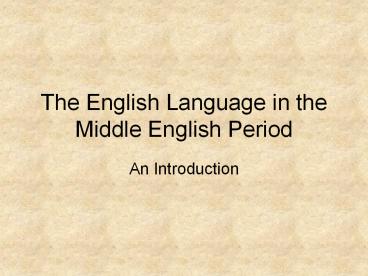The English Language in the Middle English Period - PowerPoint PPT Presentation
1 / 12
Title:
The English Language in the Middle English Period
Description:
... literary familiarity (Chaucer, Christmas carols, folk songs, lullabies, nursery ... early ME carol: Sumer is icumen in Spring has come in. Lhude sing cuccu ... – PowerPoint PPT presentation
Number of Views:2681
Avg rating:3.0/5.0
Title: The English Language in the Middle English Period
1
The English Language in the Middle English Period
- An Introduction
2
Middle English (1066-1500)
- Many more texts than OE period
- No standard variety of English
- Dates
- 1066 Norman Conquest
- 1100 Round number!
- 1476 First printing in England (Caxton)
- 1485 Accession of Henry VII (Tudor)
- Germanic, highly inflected ? hybrid (many
loans), lightly inflected
3
Chaucer, Reeves Tale (late 14th c.)
- How fare thy fair daughter and thy wife?
- And John also, how now, what do ye here?
- Ælfric, Preface to Genesis (late 10th c.,
modernized characters) - Tha wande he ongean to tham cynge.
- God gesceop us twa eagan and twa earan.
- also, literary familiarity (Chaucer, Christmas
carols, folk songs, lullabies, nursery rhymes)
30 days hath September
4
But! Continuity
- OE texts copied in ME period laws, Anglo-Saxon
Chronicle, homilies, psalters, medicinal texts,
etc. - early ME carol
- Sumer is icumen in Spring has come in
- Lhude sing cuccu- Loudly sing, cuckoo!
- Groweþ sed and bloweþ med Seed grows and meadow
blooms - And springþ þe wude nu- And the forest springs up
now. - Sing cuccu Sing, cuckoo!
- Awe bleteþ after lomb- Ewe bleats after lamb,
- Lhouþ after calue cu- Cow lows after calf,
- Bulluc sterteþ bucke uerteþ Bullock leaps, buck
farts, - Murie sing cuccu- Merrily sing, cuckoo!
- Cuccu cuccu- Cuckoo, cuckoo,
- Wel singes þu cuccu You sing well, cuckoo.
- Ne swik þu nauer nu- Nor cease you never now!
- Sing cuccu nu sing cuccu- Sing cuckoo now, sing
cuckoo! - Sing cuccu sing cuccu nu- Sing cuckoo, sing
cuckoo now!
5
Why were OE texts updated?
- Antiquarian interest
- Religious texts of practical use for sermons,
devotional reading - Ongoing oral tradition between OE and ME -
formula, aphorism
6
Why didnt English die?
- Political dominance usually accompanied by
linguistic dominance - By Chaucers die, French was foreign again
- By 1076, English rebellion crushed - French the
language of power (barons, bishops, abbots) - Anglo-Norman French
- Kings spent a lot of time in France
- Richard I 6 months in England
- William I couldnt learn English
7
The Reasons
- Extensive written literature, strong oral
tradition - Vibrant vernacular religious tradition
- Anglo-Saxon texts in 11th c. manuscripts
(Beowulf) - Political uncertainty, continuing French/English
strife - brutal occupation in 11th c. ???100
Years War (1337-1453) - French the - language of the enemy
- Not enough Normans in England (10-15,000 of 1.5
million) 3 million by 1300 - Most had no contact with French
- Bilingual class (aristocracy, senior clergy,
merchants) small - Pressure to learn English baronial staff, clergy
- Few French women came to England - lots of
intermarriage - bilingual kids
8
- Lots written in Latin, restricted sphere of
French - French used in formal domains (law, literature,
arts) but never the sole official language - Role of English sharply defined second-class in
speech, rare in writing - Triglossia 1 low status, 2 competing high-status
languages (cf. Tunisia French, Classical Arabic,
colloquial Arabic) ? diglossia (Latin/Eng) ?
monoglossia - By 1200, noble children speak English, learn
French - But by ca. 1350, still very little English writing
9
The Impact of French
- English had to adapt to new functions - no
suitable English for many domains - Old English now archaic
- Law, architecture, estate management, music,
literature - specialized vocabulary - Loans not individual, but clustered
- New words change pronunciation
- New spellings
- Foreign compounds, idioms, formulas
10
Expansion of Written English From Memory to
Written Record
- Many new churches more scriptoria, more scribes,
more MSS - New monastic rules/guidelines
- More preaching, pastoral work (English needed)
- Writs/charters 2,000 in OE period, hundreds of
thousands in ME period - Records of apprenticeship, guild membership,
military conscription, court records, parish
registers, manorial records, tax records,
accounts of royal income - mostly Latin, but soon
in English
11
12th Century Renaissance
- New language in theology, philosophy, logic, law,
cosmology, medicine, mathematics - Renewal of interest in Classics (Latin, Arabic,
Greek) - Translations into English
- English secular music/lit poet-musicians
influenced by Continental traditions
12
From Anglo-Norman to French
- 13th c. French an international language of
culture/fashion, but Parisian French - learned as
a foreign language - French replaced Latin in administrative settings
(court, parliament, business) - persisted into
15th century































